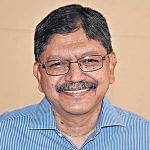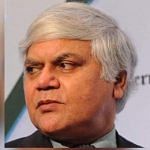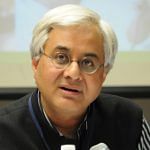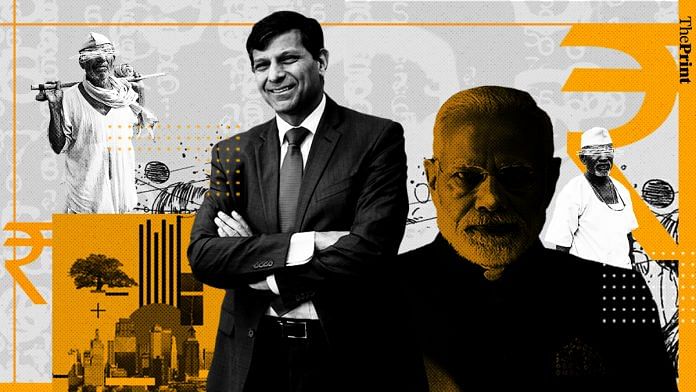Former RBI governor Raghuram Rajan has said that the Indian economy is “too big an economy to be run from the top”, criticising the Narendra Modi PMO for taking an “extremely centralised” approach.
ThePrint asks: Is Raghuram Rajan right to say strong Modi PMO, centralised decision-making hurt economy?
Rajan right to call out Modi govt’s governance model. Modi should know PMO and CMO are different
 Mihir Sharma
Mihir Sharma
Economist and Senior Fellow at Observer Research Foundation
Raghuram Rajan is right to call out the Narendra Modi model of governance as struggling. The Prime Minister contested in 2014 on his record as the chief minister of Gujarat, where a similar micro-management style appeared to have paid dividends in terms of growth.
But there is a vast difference between the PMO and a CMO. While a chief minister can behave like a project manager, taking a close interest in every major decision and its implementation, the Prime Minister cannot.
A PM must set a policy direction, and ensure that administrative processes are structured in such a way that this policy direction is carried out at every level of the central government. But that needs a coherent policy vision in the first place, which as Rajan pointed out, is lacking. What a PMO cannot do is be the final clearinghouse for every major file, the final touchpoint for every major decision. That is not being a “strong PM”, it is being a weak manager.
A centralised vision of governance is particularly difficult when the PMO itself is no greater in size. There is no full-time economist advising the PM, for example, the way Larry Summers advised then US President Barack Obama.
If PM Modi wished to change how decisions were made, he should have expanded the PMO, and stopped relying on bureaucrats to carry out his instructions.
To blame centralised decision-making for India’s economic woes may not be appropriate
 Radhika Pandey
Radhika Pandey
Fellow, NIPFP
Every government has a particular way of functioning and formulating policies. It is true that major policy decisions are based on the concurrence of the bureaucratic machinery at the PMO, but to blame the centralised decision-making model of governance for the economic woes of India may not be appropriate.
We do not have a counterfactual evidence to say this with certainty. In a diverse economy like India, there may be a case for single point decision-making when diverse interests and trade-offs have to be taken care of.
Having said that, it is not true that ministers are disempowered. The Indian bureaucracy is responsible for providing broad direction of reform agenda, but whether reforms see the light of day ultimately depends on political will.
While the Modi government has brought in several structural reforms like the inflation targeting regime, the Insolvency and Bankruptcy Code (IBC), the GST, opening up FDI; some policies were implemented hastily, which derailed the economy from its high growth path. The lesson is to formulate appropriate counter-cyclical policy responses to arrest slowdown.
The government has been taking a number of measures, but more needs to be done. It is also to be acknowledged that economic revival is a slow and painful process and the Modi government would do well to avoid hasty policy jerks.
Views are personal.
Also read: Indian economy is now too big to be run from PMO: Raghuram Rajan
Would be excessive to blame slowdown on this PMO, but that office must also take its share of blame
 Narendar Pani
Narendar Pani
Professor, National Institute of Advanced Studies
A strong PMO invariably leads to errors in economic decision making. This was true even during Indira Gandhi’s regime. Under Narendra Modi, the PMO has become more centralised and even more prone to errors in economic policy.
From demonetisation to GST, there is no dearth of economic policies riddled with issues in conceptualisation and enforcement.
Conceptualisation is constrained by the reliance on a few trusted minds in the PMO or other small groups, rather than gaining from the wider set of ideas that public debate throws up. The reliance on a highly centralised PMO also prevents policymakers from getting genuine feedback from those who are directly affected by the government’s policies.
Matters only become worse when a centralised PMO tries to simplify matters in a way that makes it easier to manage. Cutting down the rates of indirect taxes under GST – even pursuing a single rate – may be easier to manage, but across a diverse country, like India, it makes the rates insensitive to local conditions.
This affects tax collections, leading to a growing informal sector. As centralised policymakers seek to counter informality with stronger laws, the fear affects the sentiment of investors.
It may be somewhat excessive to blame the current slowdown on an excessively centralised PMO, but that office must also take its share of the blame.
Raghuram Rajan made a political statement in the guise of an economic one. Shows his leanings
 Narendra Taneja
Narendra Taneja
National Spokesperson, BJP
The Indian economy has sizably grown and there are institutions, structures and systems that have been put in place to run it. These systems are now comparable with the best in the world.
The economic wings of the Centre, states, regulators and the RBI form the backbone of the management of the country’s economy.
To say that the PMO is running India’s economy has nothing to do with the reality on the ground. It is very surprising that Raghuram Rajan has made such a statement because he knows how India’s economy functions. We know he has political preferences, but one expects more honesty from a person of his stature. His is a political statement in the disguise of an economist — clearly showing his liking for another political ideology over the BJP’s. Rajan is entitled to his views, but he should be more open about his political leanings and preferences.
Of course, the PMO also has a role to play in managing the economy, but that role is limited to occasional advice and ensuring that everything is done as per the Constitution and mandate of the people.
His comments were made to paint the Modi government in poor light.
The BJP has given India a strong, honest and efficient government. This government does not sleep and works like a dedicated team under Prime Minister Narendra Modi’s leadership.
Ministers do not fight with their Prime Minister like they used to during former PM and Congress leader Manmohan Singh’s terms. Raghuram Rajan likes a weak PMO, which was evident during Singh’s tenures.
Also read: Merger of state-run banks ‘right move but not at the right time’, says Raghuram Rajan
Raghuram Rajan comments justified. Centralised governance won’t have impact India needs at ground level
 A.K. Shiva Kumar
A.K. Shiva Kumar
Economist and former member of India’s National Advisory Council
Raghuram Rajan is entirely justified in reiterating that an economy of India’s size and diversity cannot be managed effectively by a centralised system of governance. This has been well understood all along. This idea was the motivation behind the 73rd constitutional amendment in 1992 that bestowed power and authority on the Panchayati Raj institutions to function as units of self-government. That no central government has acted to adequately empower panchayats is another matter. But, doing so now is critical.
India’s economic growth record in the last 25 years has been impressive. However, the country lags behind on critical dimensions of human development like health and nutrition, basic education, and tackling climate change – subjects that are principally the responsibility of the state governments, and not the central government. Unless India accelerates progress on these non-economic and other social fronts, it might become difficult for it to accelerate growth – let alone sustain it.
India’s progress in the future will hinge critically on enhancing the capacity of the state and the local governments. This is because India urgently needs to find local solutions to national problems. A strong centralised system of governance is not likely to make the impact India needs at the ground level. These can be realised only with an exceptionally strong system of decentralised governance.
By Taran Deol, journalist at ThePrint







Chinese system of governance is like our PMO system,The chinese economy is growing,but not our economy.Why?
we cannot emulate the US economy,there is emphasis on capitalism there and govt.comes in to rescue in times of trouble only,like the stimulus plan in the 2008 crisis.
we have as a nation pledged to socialist pattern of society and we have a large population family
to support.
PMO strategy should spell out its economic vision to its stakeholders ,take them along and work out
on area s needing corrective actions,
Democracy is the strong point of nation and development to be built around this political
reality .Not only the present leadership is important but also build a cadre of second level of leadership
to sustain and grow.
A strong PMO is required to fulfil the promises made. Mr Rajan having worked in a weak PMO, may not like present PMO . Monitoring a big country like India requires strong people and a broad vision. As of now the PMO is reacting fast.
Younger generation thinking now is to spend luxury like with Apple iPhone and electronic gadgets instead of purchases of car or flat. This made automobile sector recession.
Disposable income is spent for hotels , tours and travels.
Strong PMO must be intellectually strong, not averse to say “no stupid” (Politely of course) and be a civil servant, not a politician. It is our fate we have none of these.
Those who wish to have a weak PMO indirectly want to weaken Modi, the PM. Take out the USA label and a decorated PhD from Rajan, he will become unrecognization by ThePrint. Rajan is a faithful pat of Congress and his ideas as rotten as that of rotten Congress is. ThePrint journalist seems to have impressed by his USA label and a PhD and hasn’t shredded his squirely failed period of RBI governorship.
What will it take for you to remove your saffron panties and talk about economy which is in tantrum. Be fair and speak as a citizen of this country not as a student of renowned Shaka or WhatsApp university
BJP Spokesman Narendra Taneja is being disingenuous when he refuses to acknowledge what just about everyone knows – the Modi government is a highly centralised, one man show with all knowing Delhi University graduate at the helm.
For instance, in the realm of foreign policy, most foreign governments knew that it was PM Modi who called the shots and not the late Ms Sushma Swaraj (RIP). Foreign governments knew that Ms Swaraj merely issued visas or evacuated stranded Indians in trouble spots whilst it was the PM, who in his infinite Gujarati wisdom, formulated the strategic and substantial aspects of India’s foreign policy. And worse still, he represented India in fora where Ms Swaraj should have done that job, cementing the view that India was a Modi show.
Things are not much better in the realm of economics – Mr Taneja’s protestations notwithstanding. This immense centralisation under PM Modi can be downright dangerous when it comes to policy making in economics where the stakes are high and mistakes can be costly. Thus, when Mr Taneja pontificates:
.. Indian economy has .. grown .. there are institutions, structures .. systems .. in place to run it. These systems are now comparable with the best in the world ..”
He needs to answer some very obvious questions:
1: Why did these supposedly world class institutions not rein in one of the greatest acts of economic folly committed anywhere in the world viz. demonetisation? Could the answer be that the PM cares two hoots for them Mr Taneja? Do you have any idea of the damage done by demonetisation to the informal sector where 82% of Indians toil Mr Taneja?
2: Why have world class economists like Dr Raghuram Rajan, Dr Urjit Patel, Dr Arvind Subramanian etc. quit working for the government Mr Taneja? Could the answer have something to do with the fact that they were completely sidelined like Ms Swaraj was? Indeed, even economists who were BJP friendly like Dr Surjit Bhalla and Dr Jagdish Bhagwati have realised that the savant PM has no use for their wisdom.
And finally Mr Taneja, as a graduate of prestigious foreign universities (remember University of Oslo my friend) I think it is rather cheap to dismiss and pooh pooh criticism of the policies of the BJP and the PM as being Congress supporters. Do understand that one could be critical of a given regime without being a supporter of another.
Still don’t understand why scripted questionnaires of this man doesn’t include his role in hiding bank NPA-s and then killing India’s growth by artificially high interest rates. Like all Congi scholars, all gyan, no responsibility
Shri RRRajan ex governor RBI in his book Ido what I do , cleared why he had to leave RBI in the same he had his next step to control the bank NPA but before taking the step Raghu Ram in the BJP government had to go out.Next Mr.UP next ex governor had to go out RBI as he had not agreed to extra grant to government.After the latest one Mr.Das a historian ex Secretary of finance came into & sanctioned 1.76 billon crore to this government.For last five years unemployment unrest,Notebandi & GST ,now GDP ,World bank IMF has anxiety for India s slowed down economy & every thing concerned to it .Whats Niti Ayog & others are doing. Only two or three names. PMO only is government,so who to blame
Being a historian / archaeologist / marine biologist is not the nub of the issue, although a doctorate in economics from MIT would help. The RBI itself is a storehouse of specialised knowledge, expertise, institutional memory. What is required is autonomy of thought, a fine appreciation of the need to retain a perspective and focus that is not a clone of the government’s thinking or desires. Absent that, even Larry Summers would not succeed.
Larry Summer was gender biased and Harvard was forced to make him “resign”. I can see a Larry Summer in India. No one will listen to a foreigner thinking like a foreigner as per Modi axiom for RBI governorship,
Mr Raghuraman: The thrust of the article is not about why Larry Summers was forced to resign but on the fact that an office was created to advice the President. That office continued to exist even after the departure of Summers and that is what is the salient feature of the policy making approach at the White House. Thus, even now, when you have a completely autocratic and unhinged occupant in the White House, there is an adviser Peter Navarro who is tasked with providing advice to said occupant. Another story that Peter Navarro is a mere yes man and takes his cues from the man he is supposed to advice.
During the Manmohan Singh period, Raghuram Rajan was such an adviser. During the start of the Modi government, Dr Arvind Subramanian was given this role. In addition Dr Raghuram Rajan as head of RBI also provided advice in economics. But both these advisers resigned as they felt that their advice was ignored and not valued by the PM. And just as President Donald Trump does not pay heed to his staff of highly qualified economists, PM Modi does exactly the same.
Sticking to India and the PMO, one notices that harcore Hindutva ideologies cloud sound economic decision making. Thus, the Make in India initiative promotes leather manufacturing whilst cow slaughter bans cripple the leather sector. A market for beef exists that India can fulfil, especially since Brazil, a rival faltered. But again cow slaughter is not permitted. The dairy industry is likewise adversely affected by Hindutva restrictions.
The dismal economic performance of the BJP government has a multitude of reasons – a particularly serious one being the tendency to disregard expert opinion from trained professionals and the centralisation of powers within the PMO.
Oh, you, you missed too!. The story was that PMO i.e PM was looking for an Indian who thinks like an Indian. If Rajan failed, Larry Summers will most likely fail too. Remember, Indian who thinks like Inddian!! i.e PM. Got it????
The world’s greatest economic success story is predicated on colour blindness, a focus on mice catching ability. By that unforgiving metric, clearly the Indian economy is stalling in mid air, amidst placid weather and clear blue, cloudless skies. Dr Rajan’s is not a voice to be disregarded. The easiest thing in the world will be to assail him, as Shri Arun Shourie was, by saying that he wanted a government job. Not many wise people are speaking up, and we don’t like it when a few do. Whatever the causes for the economy falling off a cliff, we should acknowledge that there is a problem, and then work to fix the broken plumbing. We were all expecting the marathon to be run in less than two hours. That has not happened.